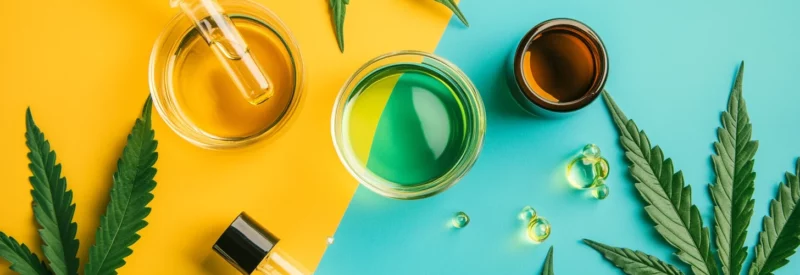Starting a CBD business requires a few key elements, and one of them is a Certificate of Analysis to pass inspections and comply with regulations for the CBD products you’d like to sell. Obtaining a COA will not only benefit your brand but also assure your customers about the safety of your CBD products. In this article, we’ll explain what a COA is, why you need it, and how to acquire one for your new business making or selling CBD. Let’s get started!
What Is a COA?

A COA is a document that provides detailed information about the contents of a CBD product. This includes data such as cannabinoid types, weight percentage, concentration, and the results of a heavy metal and pesticide analysis. Moreover, COAs are a way to offer transparency and safety assurance for your CBD products, which is vital for sellers, consumers, and the entire CBD industry as a whole.
Why COA Is Crucial for Selling CBD Products
The CBD market has experienced explosive growth in recent years. While this brings lots of opportunity, it also raises concerns about product quality and safety. COAs play an important role in addressing governmental and consumer concerns by ensuring that CBD products meet specific quality and safety standards. This helps to establish more trust and transparency throughout the industry.
COAs can also provide concrete evidence of a product’s relative cannabinoid properties and overall quality, as well as help consumers make more informed decisions about what they put in their bodies. At the same time, COAs help retailers and manufacturers demonstrate their commitment to product quality. COAs can also offer legal protection for manufacturers and retailers, as they prove products comply with state and federal standards in the case of legal disputes.
Benefits of a Certificate of Analysis (CoA) for CBD Products
There are several benefits to using COAs for CBD products. Here are just a few:
Enhancing Trust and Transparency in the CBD Market
The CBD market has all types of CBD products these days, from oils and tinctures to edibles and topicals. This diversity is a boon for consumers seeking options that cater to their unique wellness needs. However, the sheer abundance of products today means more diligence is required of both retailers and consumers who have concerns over the quality and safety of their products. COAs solve this problem by creating a transparent and accountable ecosystem within the CBD industry. For example, when consumers purchase a CBD product, many want to know exactly what they’re putting into their bodies. A COA lists the product’s exact cannabinoid profile, concentration, and the absence of harmful contaminants.
For merchants, having a COA is a competitive advantage because it instills consumer confidence in the products you sell. When your customers who want one can access a COA for a product, they’re far more likely to trust your brand and make a purchase. Over time, this trust can lead to customer loyalty, which is invaluable in a market as competitive as the cannabis and CBD industry.
Safety Assurance: Why Retailers and Consumers Need a CoA
Certificates of analysis for your CBD products are, in short, a tool for safety assurance. Providing detailed information about the contents and possible contaminants in a CBD product, COAs ensure product safety for both retailers and consumers.
For retailers, the safety of your CBD products isn’t just a moral obligation but also a legal one. Many countries and states have regulations requiring CBD products to meet specific safety standards. Failure to comply with these regulations can result in legal consequences, including product recalls and financial penalties. In other words, COAs protect retailers by serving as proof of compliance with state and federal safety regulations.
Having CBD products comply with regulations helps protect consumer health by ensuring said products are free from harmful substances like heavy metals and pesticides. So, say, when your customers see a COA that verifies your product’s safety—especially those using CBD to address health issues, they can be confident yours is safe. And that’s just good for business.
How to Read a CBD Certificate of Analysis (CoA)
Reading a CBD Certificate of Analysis can be daunting if you’re unfamiliar with the terminology. Every lab has its report template. Still, you should be able to get the following information from each CoA.
Let’s break down some of the key elements:

Cannabinoid Types
One of the first things you’ll find in a COA is a list of cannabinoid types. These are the various compounds present in CBD products that offer different medicinal properties, such as cannabidiol (CBD) which is perhaps the most well-known. But there are many others, including tetrahydrocannabinol (THC), cannabigerol (CBG), and cannabichromene (CBC). Understanding the different cannabinoids and their concentrations is essential for determining the effects a product may have.
Look to see if your COA says N/D (Not Detected or Not Detectable) or <LOQ (less than Limit of Quantitation). This would mean there is so little it’s undetectable. In other words, there is not enough of a given cannabinoid — such as THC — to be measured by that test.

Weight Percentage
Weight percentage indicates the proportion of each cannabinoid in the product. For instance, if a product has 15% CBD and 0.3% THC, these values will show in the COA. This information is valuable for consumers who want to ensure they are getting the specific cannabinoid content they desire.

Concentration
Concentration is a more specific measure of the cannabinoids present. It is usually expressed in milligrams (mg) per milliliter (ml) for liquids or per gram (g) for solids. Concentration is crucial for determining the dosage and potency of a product. For example, a high concentration of CBD in a tincture means that a smaller volume will provide a more significant dose.

Heavy Metal Analysis
COAs often include a section on heavy metal analysis, which checks for the presence of toxic heavy metals like lead, cadmium, and mercury. The results should indicate that these substances are either undetected or present at safe levels. This is crucial for ensuring the product’s safety, as heavy metal contamination can have serious health consequences.

Pesticide Analysis
Pesticide analysis checks for the presence of harmful pesticides and herbicides. Like heavy metals, the results should show that these chemicals are not detected or are present at safe levels. This analysis is essential for ensuring the product is free from potentially harmful agricultural chemicals.
CoA Example
To illustrate how a Certificate of Analysis looks, let’s consider an example. Suppose you want to purchase a CBD oil product. The COA for this product might look something like this:
Sample ID: 864325CSALA257
Matrix: Concentrates & Extracts
Type: Tincture
Sample size: 1 unit
Batch #: FWYTNK41326
Collected: 1/5/2024
Received: 1/5/2024
Completed: 1/12/2024
Client: Herbal Harmony CBD
| Analyte | LOD | LOQ | Results (mg/package) | Results (mg/ml) |
| CBDa | 0.00587 | 0.02893 | 656.98 | 21.90 |
| CBD | 0.01079 | 0.02893 | 78.98 | 2.63 |
| THCa | 0.00648 | 0.02893 | 14.18 | 0.47 |
| Δ9-THC | 0.01224 | 0.02893 | 7.52 | 0.25 |
| CBC | 0.00414 | 0.02893 | 4.34 | 0.14 |
| CBGa | 0.00567 | 0.02893 | 3.76 | 0.13 |
| CBG | 0.01079 | 0.02893 | 2.03 | 0.07 |
| CBDV | 0.00289 | 0.02893 | ND | ND |
| CBN | 0.00469 | 0.02893 | ND | ND |
| THCV | 0.01134 | 0.02893 | ND | ND |
| Δ8-THC | 0.01218 | 0.02893 | ND | ND |
| Total | 767.78 | 25.59 |
What to Watch Out for in a CBD COA
High-risk businesses like those that sell CBD should watch out for certain red flags. Not all COAs are created equal. Take a look at the following when examining your COA documents:
1. Too much or too little THC
THC, or delta-9-tetrahydrocannabinol, is a psychoactive compound found in cannabis. While the legal status of THC varies by jurisdiction, many CBD products are required to contain less than 0.3% THC to be considered legal in the United States. It’s crucial to check the THC content in a CBD product’s COA to ensure that it complies with legal limits.
Watch out for:
- Excessive THC: A COA that indicates a THC content above the legal limit can have legal consequences, and it may not be suitable for those seeking a THC-free experience.
- Inadequate THC: On the flip side, a product with too little THC may not provide enough of the desired effects for individuals seeking full-spectrum or broad-spectrum CBD products. If a COA shows THC levels below the stated legal limit, it could indicate a mislabeled or substandard product.
2. Missing cannabinoids in “full-spectrum” products
Full-spectrum CBD products are often marketed as containing a wide range of cannabinoids, terpenes, and other beneficial compounds naturally found in the cannabis plant. However, some COAs may not reflect the comprehensive cannabinoid profile promised by the product.
Watch out for:
- Incomplete cannabinoid profile: In a genuine full-spectrum CBD product, the COA should list multiple cannabinoids, not just CBD and THC. If the COA only mentions CBD and THC, it might not be as full-spectrum as it’s claimed, or it could be some CBD isolate product.
- Undisclosed isolates: In some cases, a COA may indicate the presence of additional cannabinoids but fail to specify the types and concentrations. This lack of transparency may not guarantee the expected benefits of a full-spectrum product.
3. Lab results completed in-house instead of 3rd party
The reliability and credibility of a COA depend on the independence of the testing lab. In-house testing conducted by the manufacturer or retailer can lead to conflicts of interest and biased results.
Watch out for:
- In-house testing: When a COA states that testing was conducted by the same company selling the product, it raises questions about objectivity. Independent third-party testing labs can provide more reliable and unbiased assessments.
- Lack of accreditation: Even when a COA claims third-party testing, it is important to ensure that the lab has the right certifications and follows rigorous testing standards. Accredited labs are more likely to deliver accurate results.
Final Thoughts on CBD COA
In the ever-expanding CBD market, consumers and retailers should remain cautious when evaluating the quality and safety of CBD products. A Certificate of Analysis is an invaluable tool for making informed decisions—however, not all COAs are created equal. Examine these documents with care, for they can provide insights into your product’s cannabinoid content, safety, and quality—and contribute to the safety and trustworthiness of the entire industry. This is an important requirement to open a CBD merchant account because financial institutions and payment processors prioritize compliance and risk reduction. Valid COAs signal a dedication to selling safe, quality products, fostering trust among both consumers and within the industry.
CBD Businesses Wanted!
Your troubles of getting approved are over.
Approval
Rating






